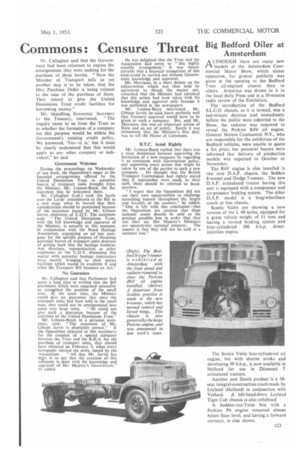Commons: Censure
Page 69

If you've noticed an error in this article please click here to report it so we can fix it.
Mr. Callaghan said that the Government had been reluctant to expose the arrangements they were making for the purchase of these lorries. "Now the Minister of Transport tells us yet another step is to be taken, that the Hire Purchase Order is being relaxed in the case of the purchase of them. They intend to give the United Dominions Trust credit facilities for borrowing money."
Mr. Maudiing, Economic Secretary to the Treasury, intervened. "The inquiry came to us from the Trust as to whether the formation of a company for this purpose would be within the Government's existing credit policy. We answered, 'Yes—it is,' but it must be clearly understood that this would apply to any other company or indi
vidual," he said.
Government Welcome During the proceedings on Wednesday of last week, the Opposition's anger at the financial arrangements offered by the United Dominions Trust to potential buyers of transport units brought from the Minister, Mr. Lennox-Boyd, the flat statement that he welcomed them.
Mr. Callaghan (Lab.) took the battle over the Lords' amendments to the Bill to a new stage when he moved that their consideration should be postponed because of the statement issued by Mr. Gibson Jarvie, chairman of U.D.T. The statement said: "The United Dominions Trust, with the full knowledge and approval of the Minister, is actually at this moment, in conjunction with the Road Haulage Association, organizing an ad hoc company for the specific purpose of financing potential buyers of transport units desirous of getting back into the haulage business. Any directors, representatives or other employees of the U.D.T. discussing this matter with potential haulage contractors were merely bringing to their notice facilities which would be available if and when the Transport Bill becomes an Act."
No Guarantee Mr. Callaghan said that Parliament had spent a long time in writing into the Bill provisions which were supposed ostensibly to strengthen the position of the small man. At the same time, the Minister could give no guarantee that once the transport units had been sold to the small man, they could not be amalgamated into some very large units. " He could not give such a guarantee because of the activities of the United Dominions Trust.'
Mr. Lennox-Boyd, in a personal statement, said: "The statement of Mr. Gibson Jarvie is absolutely correct." If the Opposition objected to this machinery for the creation of a special company between the Trust and the R.H.A. for the purchase of transport units, they should have objected on February 5, when every newspaper carried the news, issued by the Association. " All that Mr. Jarvie has done is to say that the creation of this company is done with the knowledge and approval of Her Majesty's Government," he added.
Ele was delighted that the Trust and the Association had come to "this highly sensible arrangement." It was inconceivable that a financial transaction of this kind could he carried out without Government knowledge and approval.
Mr. Morrison, in a short debate on the adjournment which was then held by agreement to thrash the matter out, remarked that the Minister had admitted that this action had been taken with his knowledge and approval only because it was published in the newspapers. Mr. Lennox-Boyd intervened. Mr. Gibson Jarvie, he said, knew perfectly well that Treasury approval would have to be given to such a company. But, said Mr. Morrison, this was an important action of State and an act of policy. Surely it was elemcntaay that the Minister's first duly was to tell the House of Commons.
B.T.C. Acted Rightly Mr. Lennox-Boyd replied that there was a clear distinction between approving the formation of a new company by regarding it as consistent with Government policy, and approving every action that might be taken by one of the parties to such a new company. He thought that the British Transport Commission had rightly stated that if approaches were made to their staff, these should be referred to headquarters.
"I regret that the Opposition did not use their own opportunities to challenge something known throughout the length and breadth of the country," he added. "One is left with this conclusion—that the Opposition are anxious that these national assets should be sold at the greatest possible loss in order that they can then say Her Majesty's Ministers are squandering national property. The answer is that they will not be sold at a national loss."








































































































































































































































